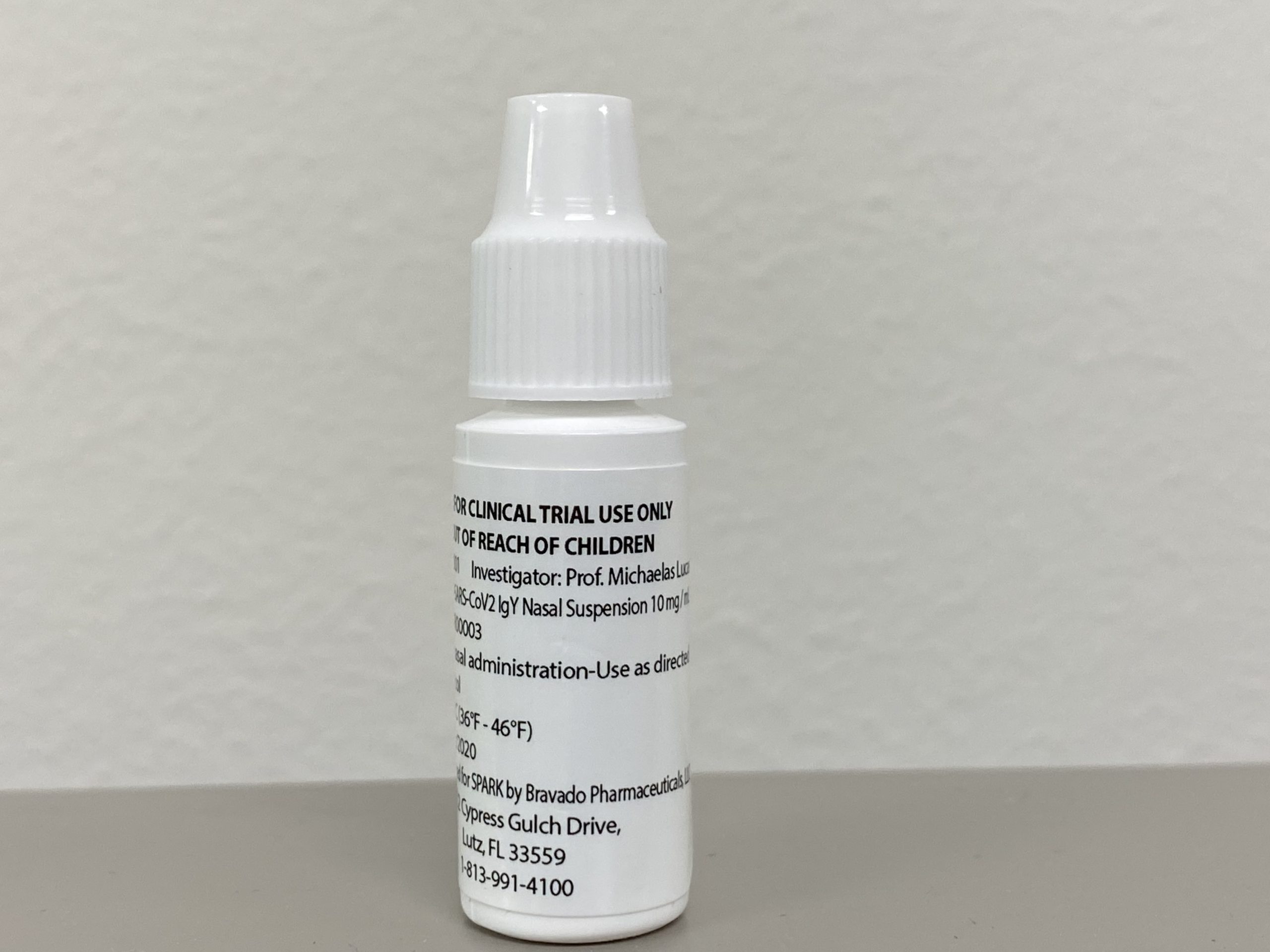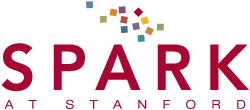Bridging The Gap

SPARK publishes clinical trial results of IgY antibody-based nasal drops against SARS-CoV-2
July 14, 2022
Back in March 2020, Daria Mochly-Rosen came across a fresh, novel idea to try to combat the emerging COVID-19 threat. After discussions with a colleague about research on the use of IgY – antibodies from the eggs of immunized hens – to protect against viral disease in humans and animal farms, she thought, why not use SPARK experts and expertise to develop IgY antibodies to combat the COVID pandemic?
Now, the international team of academics and industry groups that Dr. Mochly-Rosen brought together has published results of a Phase I clinical trial testing IgY-based nasal drops against SARS-CoV-2 in humans.
The study, published in Frontiers in Immunology, demonstrated that anti-SARS-CoV-2 IgY had an excellent safety profile and was well tolerated in humans. Additionally, the anti-SARS-CoV-2 IgY had nearly identical neutralization titers against SARS CoV-2 variants of concern including Alpha, Beta, Delta, and Omicron in ELISA and in infected cells in culture, suggesting the nasal drops could work just as well against the Omicron variant as the index virus.
Dr. Mochly-Rosen said, “So far, the use of IgY in humans is quite limited and there were no data on the safety of IgY given intranasally. The human safety data that we have generated can support future studies to protect humans from COVID as well as from other airborne viruses.”
The project began when Dr. Mochly-Rosen discussed with Michael Wallach, professor at University of Technology, Sydney and co-director of SPARK Australia, his previous work testing chicken antibodies as protection against influenza viruses in mice. The team considered different proteins that could be used to immunize hens against viral disease, and immediately began contacting people to join the project.
Chicken IgY antibodies have been used for years to protect farm animals, livestock and chickens themselves from disease, and have been tested for multiple infectious diseases. The team thought the approach would be safe for humans, inexpensive, fast and easy to produce even in resource-limited countries, attributes necessary to combat a rapidly growing global threat.
The nasal drops contain IgY antibodies that develop in hens immunized with a fragment of the spike protein of the SARS-CoV-2 virus. The antibodies are passed to the hen’s eggs, extracted from the egg yolks, and formulated into the drops. When administered via the nose, the drops can provide short term, immediate immunity against SARS-CoV-2.
In October 2020, the Phase I clinical trial began at Linear Clinical Research in Perth, Australia. The clinical trial examined single-ascending and multiple ascending doses of anti-SARS-CoV-2 IgY nasal drops, given three times a day for 14 days in 48 healthy volunteers enrolled in a randomized, double-blind, placebo-controlled study.
Successful drug development projects during the COVID-19 pandemic relied on rapid work, collaborative efforts, and often, large sums of funding. The amazing, rapid pace of research was due to multiple irons in the fire and a sense of everyone all in at once.
While the story of Daria Mochly-Rosen and the SPARK team’s chickens is one of rapid coordination, it goes beyond the usual suspects in its collaboration. Here, the success of the project is due to the exceptional contributions of unique players from academia and industry who contributed time, various knowledge and skills, and even participated without financial compensation. Without the help of the assorted international team members, the project would never have gotten this far. Dr. Mochly-Rosen said, “Without the work of many volunteer industry advisors at SPARK at Stanford and many at the commercial entities, Charles River Laboratories, Sutro Biopharma, Bravado Pharmaceuticals and Linear Clinical Research, who dedicated much time and effort on and off hours, the study would not have been completed to such a high standard and in such a record time; it took only 7 months from the first hen immunization to the successful completion of the clinical trial!”
The first commercial group that Dr. Mochly-Rosen brought in was Sutro Biopharma. Sutro, a biotech founded by a former SPARK scholar, is unique in that it can make proteins in vitro, rather than expressing them in bacteria or human cells. Sutro was happy to help develop the antigen protein that would be used to immunize chickens to produce IgY antibodies.
Linear Clinical Research has been a huge support for the project. This medical research facility contracts to conduct clinical trials and research at a state-of-the-art facility in Perth, Australia, and is experienced and well-equipped to handle this type of work. Jayden Rogers, Linear Clinical Research CEO said, “We were thrilled to work closely with SPARK at Stanford on a successfully executed phase I study that is a demonstration of scientists coming together in a time of need. The nasal drops have the potential to help millions of people worldwide, with all parties correctly assessing that this was a global problem requiring global solutions.”
Another major contributor to the effort is Charles River Avian Vaccine Services, a subsidiary of contract research organization Charles River Laboratories. Charles River Avian, led by Director of Laboratory Operations Nastassja Ortega-Heinly, handled chicken immunization and antibody production, purification and characterization. Charles River Laboratories also performed many of the tests needed for the project, including an in vivo intranasal safety study in rats and other safety studies. Dr. Ortega-Heinly said, “This COVID IgY project certainly showcased what collaboration should be. Multiple companies coming together in the fight against COVID. Charles River Avian Vaccine Services was a key part in the development, using our extensive knowledge in IgY production. Surprisingly, most people do not know how universal an egg can be. From drug discovery to therapeutics, the possibilities are endless!”
Meanwhile, Bravado Pharmaceuticals, a contract development manufacturing organization, formulated and produced the nasal drops, including for the clinical trial and other testing. “At Bravado Pharmaceuticals we are proud to have been a part of such a transcendent project. The potential of CoVer’s IgY prophylaxis is incredulous,” said Brian McMillan, Bravado CEO.
SPARK’s extraordinary advisors jumped in to help as well. At the forefront is Lyn Frumkin, a longtime SPARK advisor and clinical trial expert. Dr. Frumkin designed the clinical trial, aided with regulatory compliance and connected the team to other experts who could assist. Additional SPARK advisors provided advice on regulatory affairs (Dr. Curt Scribner), project management (Drs. Mahima Agochiya and Rebecca Begley), formulation and more.
Members of Dr. Mochly-Rosen’s lab also contributed greatly to the project. First-year graduate students Ben Kraemer and Suman Pokhrel, who worked with Dr. Mochly-Rosen on additional computational SARS-CoV-2 variant research, provided invaluable work for this project as well.
The next step for the project is to find an organization that will support efficacy studies in humans (Phase II/III). Unfortunately, this is a very expensive step that is impossible to complete within academia. Dr. Mochly-Rosen hopes to secure a commercial or non-profit organization that can develop the anti-SARS CoV-2 IgY nasal drops to benefit not only high income countries, but also deploy them in low resource countries.
Dr. Mochly-Rosen added, “With a team of undergraduate students, we showed that it is possible to produce high quality purified IgY even in remote areas of the world, and without access to sophisticated laboratory equipment. We hope that such intranasal IgY will help arrest the continual spread of SARS-CoV-2 worldwide and curb the spread of other airborne viruses that pose epidemic threats.”
This project was supported by SPARK at Stanford, the George D. Smith Endowed Chair to Daria Mochy-Rosen, and multiple donations.
